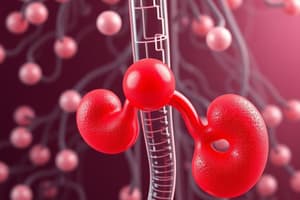Podcast
Questions and Answers
Which of the following are diuretic actions? (Select all that apply)
Which of the following are diuretic actions? (Select all that apply)
- Decrease renal ion transport (correct)
- Increase Na+ reabsorption
- Increase urine volume output (correct)
- Reduce systolic and diastolic blood pressure (correct)
Thiazide diuretics are preferred as antihypertensives.
Thiazide diuretics are preferred as antihypertensives.
True (A)
What is natriuresis?
What is natriuresis?
Increase in sodium output in urine
Diuretics can help manage __________ fluid retention.
Diuretics can help manage __________ fluid retention.
Name a common loop diuretic.
Name a common loop diuretic.
What are side effects of diuretics? (Select all that apply)
What are side effects of diuretics? (Select all that apply)
What is a risk associated with prolonged use of diuretics?
What is a risk associated with prolonged use of diuretics?
Match the following diuretic types with their characteristics:
Match the following diuretic types with their characteristics:
Potassium-sparing diuretics can lead to hyperkalemia.
Potassium-sparing diuretics can lead to hyperkalemia.
Which diuretic is commonly used for glaucoma?
Which diuretic is commonly used for glaucoma?
What is the mechanism of action of osmosis diuretics?
What is the mechanism of action of osmosis diuretics?
What characterizes the disorder associated with polydipsia?
What characterizes the disorder associated with polydipsia?
Which receptors do arginine vasopressin (AVP) predominantly mediate serum sodium and serum osmolality?
Which receptors do arginine vasopressin (AVP) predominantly mediate serum sodium and serum osmolality?
Conivaptan is approved for oral use.
Conivaptan is approved for oral use.
What is tolvaptan used for?
What is tolvaptan used for?
Loop diuretics are much preferred in severe cases especially when GFR is ______.
Loop diuretics are much preferred in severe cases especially when GFR is ______.
What are the common diuretics used for hypertension?
What are the common diuretics used for hypertension?
Diuretics can lead to hyperkalemia as a side effect.
Diuretics can lead to hyperkalemia as a side effect.
What state is known as volume depletion?
What state is known as volume depletion?
Which solution is commonly used for the correction of hypovolemia?
Which solution is commonly used for the correction of hypovolemia?
What are the symptoms of hyperhydration?
What are the symptoms of hyperhydration?
Flashcards are hidden until you start studying
Study Notes
Diuretics Overview
- Diuretics increase urine volume by inhibiting renal ion transporters, decreasing sodium reabsorption in the nephron.
- They promote natriuresis and diuresis, enhancing sodium and water output.
- Commonly used for treating hypertension and managing fluid retention (edema).
Mechanism of Antihypertensive Effects
- Short-term use leads to volume depletion and hypovolemia.
- Prolonged application causes vasodilatation due to decreased intracellular sodium and calcium.
Types of Diuretics
- Thiazide Diuretics: Preferred for hypertension; includes hydrochlorothiazide and chlorthalidone.
- Loop Diuretics: More potent but less effective for blood pressure; examples include furosemide and bumetanide.
- Potassium-Sparing Diuretics: Prevent potassium loss by antagonizing aldosterone; includes spironolactone and eplerenone.
- Carbonic Anhydrase Inhibitors: Weak diuretics leading to bicarbonate diuresis; includes acetazolamide.
- Osmotic Diuretics: Increase osmotic pressure to prevent water reabsorption; mannitol is a key example.
Clinical Applications
- Treatment for hypertension, heart failure, acute renal failure, liver cirrhosis, and edema.
- Specific disease management includes glaucoma (carbonic anhydrase inhibitors) and hyperaldosteronism (spironolactone).
Side Effects of Diuretics
- Common: Hyponatremia, hypokalemia, hyperglycemia, and metabolic alkalosis.
- Loop and thiazide diuretics carry increased risks of hyperuricemia and hyperlipidemia.
- Prolonged use may lead to atherosclerosis.
Hypokalemia Risk
- Diuretics increase sodium in the distal tubule, leading to increased potassium loss.
- Regular monitoring of serum potassium is essential; potassium supplementation may be necessary.
Specific Types of Diuretics
- Thiazides: Inhibit Na+/Cl– cotransporter; effective for hypertension and congestive heart failure. Risk of hypokalemia and hyperuricemia.
- Loop Diuretics: Inhibit Na+/K+/2Cl− pump; used for acute pulmonary edema and hypercalcemia. Risk includes ototoxicity and hypovolemia.
- Potassium-Sparing Diuretics: Reduce sodium absorption to prevent K+ loss; effective for heart failure and cirrhosis. Potential for hyperkalemia and antiandrogenic effects (spironolactone).
SGLT2 Inhibitors
- Medications like canagliflozin and empagliflozin inhibit glucose reabsorption in the kidney, leading to increased glucose and sodium excretion.
- Adverse effects include urinary tract infections, weight loss, and potential for hypotension.
Antidiuretic Hormone Agonists
- Vasopressin and desmopressin used for central diabetes insipidus by activating V2 receptors in the kidneys.### Polydipsia and Urine Dilution
- Polydipsia characterized by excessive thirst and large volumes of dilute urine.
- Arginine vasopressin (ADH) regulates serum sodium and osmolality via increased water retention in kidneys.
Vasopressin (ADH) Antagonists
- Antidiuretic hormone antagonists inhibit effects of ADH in collecting tubule.
- Conivaptan (IV only) blocks AVP binding on V1a and V2 receptors; used to treat hyponatremia.
- Oral agents: tolvaptan, lixivaptan, and satavaptan selectively target V2 receptors.
Tolvaptan
- Oral selective V2 receptor antagonist; FDA approved.
- Effective for treating hyponatremia in heart failure, cirrhosis, and inappropriate ADH syndrome.
- Used as adjunctive therapy with diuretics in congestive heart failure (CHF).
Therapeutic Applications of Diuretics
- Thiazide diuretics: used for hypertension, particularly in patients with normal renal function.
- Loop diuretics: preferred for severe cases of CHF and renal failure, can be given IV for acute pulmonary edema.
Diuretics Classification
- Strong diuretics: Furosemide, bumetanide, etacrynic acid.
- Moderately strong: Thiazides, chlortalidone.
- Weak diuretics: Triamterene, aldosterone antagonists (spironolactone), carbonic anhydrase inhibitors.
Mechanism of Action of Diuretics
- Carbonic anhydrase inhibitors: increase urinary Na, HCO3, K by inhibiting NaHCO3 reabsorption in PCT.
- Osmotic diuretics: exert osmotic effect in PCT to increase urine excretion.
- Loop diuretics: inhibit Na/K/2Cl transporter in thick ascending limb (most effective for Na, K, Ca, Mg).
- Thiazide diuretics: inhibit NaCl cotransport in distal convoluted tubule, increase Na, K excretion but decrease urinary Ca.
- K-sparing diuretics (e.g. spironolactone): antagonist of aldosterone, increase urinary Na but decrease K, H secretion.
Uses of Diuretics
- Carbonic anhydrase inhibitors: glaucoma, epilepsy, mountain sickness.
- Osmotic diuretics: cerebral edema, acute renal failure, drug toxicity.
- Loop diuretics: drug of choice for acute pulmonary edema and heart failure.
- Thiazide diuretics: commonly for hypertension, mild heart failure, nephrolithiasis.
- K-sparing diuretics: preferred in hepatic cirrhosis.
Side Effects of Diuretics
- Common: metabolic acidosis, hypokalemia, and dehydration.
- Loop diuretics may cause hyponatremia, hypomagnesemia.
- Thiazide diuretics associated with hypercalcemia, hypokalemia, and potential for gout.
- K-sparing diuretics linked to hyperkalemia, metabolic acidosis, gynaecomastia.
Fluid and Electrolyte Imbalance
- Homeostasis requires control of water and electrolyte distribution, along with acid-base balance.
- Total body water averages 50-70% of body weight; more in infants, less in obese individuals.
- Thirst is triggered by hypothalamic response to increased blood osmolality or dryness in oral mucosa.
Problems of Fluid Balance
- Deficient fluid volume: hypovolemia and dehydration.
- Excess fluid volume: hypervolemia and potential for water intoxication.
- Electrolyte imbalances can be deficit or excess.
Hypovolemia
- Characterized by low extracellular fluid volume, often from sodium and water loss.
- Causes include renal loss (diuresis), gastrointestinal losses (vomiting, diarrhea), trauma, or sepsis.
- Symptoms: hypotension, tachycardia, dry membranes; lab findings include elevated BUN and creatinine.
Treatment of Hypovolemia
- Crystalloid solutions: Dextrose 5%, isotonic saline, and balanced crystalloids.
- Colloid solutions: Albumin, fresh frozen plasma, used to restore blood volume.
- Balanced solutions (e.g., Lactated Ringer’s) are used for rapid blood volume restoration in emergencies.
Hyperhydration
- Excessive water intake leading to water intoxication can arise from renal failure or overproduction of ADH.
- Symptoms include edema, hypertension, and pulmonary edema.
- Treatment: halt water intake, administer diuretics and hypertonic saline if necessary.
Studying That Suits You
Use AI to generate personalized quizzes and flashcards to suit your learning preferences.




